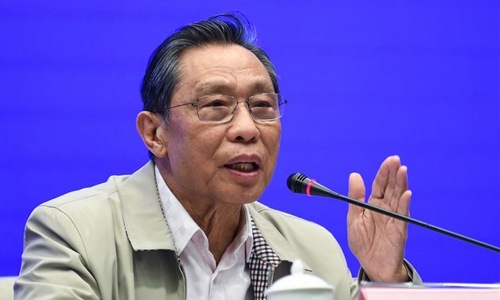China cancels about 40 COVID-19 clinical trials as epidemic ebbs
Source:Global Times Published: 2020/4/17 14:33:40

Renowned Chinese respiratory specialist Zhong Nanshan. (Xinhua/Deng Hua)
About 40 COVID-19-related clinical trials have been terminated in China, including those for Gilead Sciences' antiviral drug remdesivir, mainly because China has curbed the rising trend of the epidemic in just two weeks and most patients have been cured and discharged from hospitals, China's top respiratory specialist Zhong Nanshan said.
Many clinical research projects and trials were canceled as no one would have expected that China could contain the epidemic in such a short period, and there is almost no opportunity for large-scale clinical drug trials in China, Zhong said in an interview with the China Science Daily on Thursday.
As of Thursday, 598 novel coronavirus-related clinical trials had been approved in China, with a maximum of 32 in one day, while some 40 had been canceled.
Globally, COVID-19 clinical trials increased from 927 on April 7 to 1,135 on Thursday, while the proportion of trials in China dropped from two-thirds a week ago to half on Thursday, according to the World Health Organization.
Zhong said that most of the 600-some coronavirus-related studies and clinical trials involved observations of symptoms and testing of drugs, but it would be difficult to observe patients now as most of them have been cured and discharged from hospitals.
The first wave of the outbreak has ended, and we have well controlled the second wave, especially with the stringent prevention and control measures, Zhong said.
Among the 600-some approved trials, 27 were related to the HIV treatments ritonavir and lopinavir, and some were related to the flu medication arbidol.
Zhong said that treatments using lopinavir and arbidol had not been effective for COVID-19 patients, and a stricter approval mechanism is needed for such trials.
A clinical trial of remdesivir for treatment of COVID-19 involving mild or moderate cases has been suspended in China for the reason that the waning outbreak made it impossible to enroll enough eligible patients, according to clinicaltrials.gov, a website maintained by the US government.
"However, we cannot downplay the nearly 600 trials that were conducted," Zhong said, because they showed scientists were very enthusiastic about discussing new treatments, a situation that has been unthinkable a decade ago.
Describing the outbreak in Wuhan at the beginning of this year as an outbreak in China is wrong, as only one place in China, such a big country, recorded high number of COVID-19 cases, Zhong said.
China implemented two strategies, one in the outbreak-stricken region and one in other places.
Simply because of this, China could curb the rising trend of the epidemic in the two weeks following January 23, and it took another two weeks for the confirmed cases to drop to the preliminary level, Zhong said.
China has also encountered new challenges such as lack of big data on infections of asymptomatic patients and how to track and observe recovered patients to prevent abnormal conditions, Zhong said.
Global Times
Posted in: SOCIETY